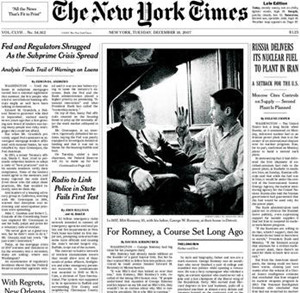
INTRO: For many Americans, The New York Times is among the most reliable newspapers in the nation both for the balance of its coverage and for the carefully neutral way that the words in its news articles are used.
For this Wordmaster report, VOA's Adam Phillips spoke with the man primarily responsible for the accuracy and correct nuance of the words that get printed in The New York Times. He is assistant managing editor Allan M. Siegal [SEe' ghell] and co-author of "The New York Times Manual of Style and Usage" the authoritative book on matters of style within his newspaper and at many rival organizations.
TEXT: In the forty years that Allan Siegal has worked at The New York Times, almost fifteen thousand daily editions of the newspaper have been published — each one full of words. It is the overall reliability of those words that accounts for The New York Times reputation in American journalism. I asked Mr. Siegal if "objective truth" is what he strives for at the newspaper.
TAPE: CUT ONE — SIEGAL
I've learned over the years to stay away from the word "objective." I do say "impartial." We do try very hard to tell the whole story and all the sides of a story — when there is a story with more than one side.
Q- Tell me a bit about style and usage here at The [New York] Times. What makes it unique? What is it about style that you really want to stress to your writers and others?
A- We try to write a language that is the equivalent of what used to be called "middle speech" by radio announcers. It's not so hip that our older established readers wold be turned off [dissuaded] by it? And at the same time it's not stodgy and doesn't read as if it comes out of a law brief. It is as straightforward and as clear as we can make it. We are read by people in a hurry many of them on trains and buses that are lurching and rocking. People are being bumped by other commuters. And we nevertheless want them to be able to get the facts in the most efficient way they can off the paper and into their heads!
Q- Can you give me one example of a delicate judgement-call that you had to make in terms of style? Sometimes you have to be very artful about how exactly you say something.
A- We try to not suggest accidentally - much less intentionally - that we are taking sides on disputed issues. The one that's probably the most difficult for us over time is abortion, because all sides have set semantic traps intentionally. Each side of that argument wants to condition the vocabulary so that they force you to speak in their language — and therefore take their side when you discuss it.
So when we say "partial-birth abortion," we are using the language of those who oppose it [abortion]. Unfortunately, the people who don't oppose it ["partial-birth abortion"] don't have a clear name for it, so we tend to fall into clumsy phrases like "what opponents call" or "critics call" partial-birth abortion. We don't use "pro-choice" because that would put you on one side of the argument and we don't say "pro-life." We talk about "anti-abortion," which is indisputable. We talk about "advocates of abortion rights," which is also indisputable.
TEXT: Mr. Siegal notes that new words to be wary of often appear with new presidential administrations. Lately, the term "faith- based" has appeared in connection with President Bush's proposal to fund some religious groups that provide social services.
TAPE: CUT TWO — SIEGAL
The [U-S] Constitution forbids certain aspects of religion in public life and the Administration, its critics would say, is trying to circumvent that. And the first thing they've done is rename "religion." So that what you or I would have six or nine months ago referred to as "a religious organization" or "a religion-sponsored organization" or a "church-sponsored organization" is now referred to, by the government at least, as "a faith-based organization."
And we think it is our job to resist the inertial pull of that kind of language and continue to use neutral language even as the government is succeeding in insinuating its vocabulary — mainly through television and TV news — into the public consciousness.
TEXT: He offers another example, this one of longer standing.
TAPE: CUT THREE — SIEGAL
"Sometime, probably in the 1940s, it became the practice to refer to "defense spending" and "defense preparation" as what the government does. [But at "The New York Times"] we still try to say "military spending" and "arms spending." Because it may be "defense" and it may be "offense." That is sometimes a very subjective judgment. ?It is possible by looking closely at the words we use to retain a questioning, skeptical stance without seeming to disparage the language other people use."
TEXT: Allan M. Siegal, an assistant managing editor at the "New York Times" newspaper, is co-author of "The New York Times Manual of Style and Usage." Roseanne Skirble and Avi Arditti will be back next week. For Wordmaster, this is Adam Phillips in New York.
詞匯點津:
今天來到《詞匯大師》的是一名紐約時報的編輯。他向我們介紹了紐約時報獨一無二的語言風格。讀者們認為紐約時報一直以來廣受歡迎的原因是語言objective,更準確地說是impartial。紐約時報秉承clear和efficient的目標,從來不刻意地引導讀者們的觀點,也就是“middle speech”,具體地說就是“not suggest accidentally - much less intentionally”
要做到這一點并不容易,比如因為在闡釋社會話題的同時,用詞就很容易受到雙方觀點的影響,例如:
如果你在談論美國墮胎問題的時候用了“partial-birth abortion”這個短語,那么你的語言已經出賣了你的態度,因為這個短語是贊成一方創造的詞匯,反對者是從來不用的。
再比如,美國社會稱國防支出為“defense spending”或“defense preparation”,但紐約時報堅持稱其為“military spending” 或“arms spending”,原因很簡單,因為國防部的defense spending有可能成為“defense”也有可能成為“offense”的開銷。











